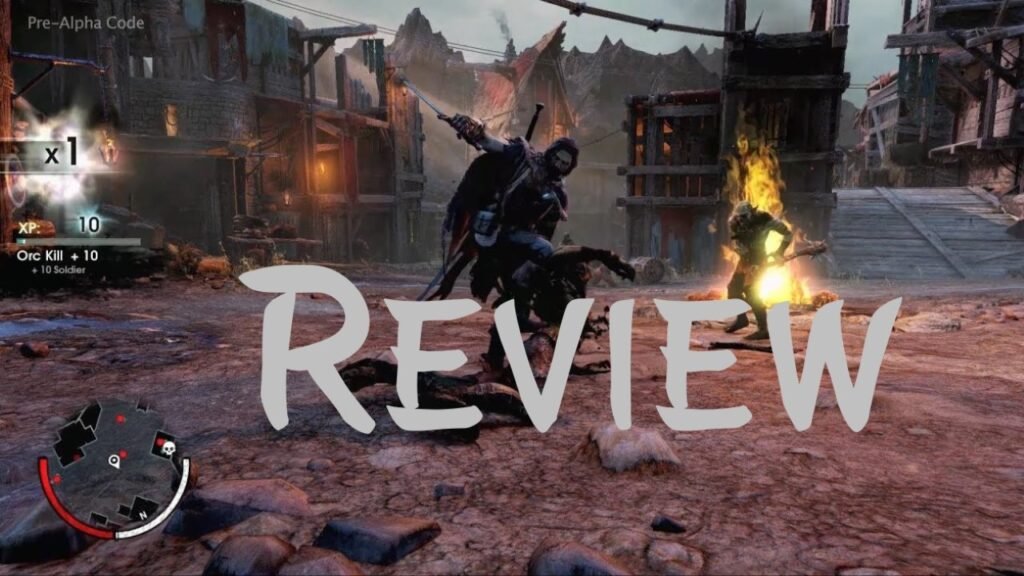
Middle-earth: Shadow of Mordor is a game that makes you feel over-the-top powerful without sacrificing the fear of defeat. It offers great, free-flowing combat and a well-designed open world full of Lord of the Rings lore to explore. But what really makes it stand out is the background system—a dynamic hierarchy of enemies that gives every victory and defeat added weight.
The game begins with a shocking opening sequence that sets a dark and brutal tone. Talion, a former ranger of Gondor, is ritually executed along with his family. His spirit is then bound to an amnesiac elf ghost, and together they are brought back to Middle-earth to seek vengeance against Sauron’s forces. While the story might not make perfect sense to hardcore Tolkien fans, it’s well-acted and engaging.
The plot also makes good use of Gollum and introduces a few memorable new characters. It does a decent job of explaining how Talion gains his supernatural abilities, including his sword, dagger, and bow. The combat system, similar to that of the Batman: Arkham games, lets you stealthily pick off enemies one at a time or dive into intense brawls with dozens of opponents, executing smooth, fluid attacks and counters. Unlike Batman, however, these animations are grittier, fitting the brutal world of Mordor. The combat feels as satisfying as the brawling in Batman, with a bit more forgiveness—Talion’s counters are extremely responsive, and his time-slowing ability makes it easy to land a couple of headshots with the bow.
Stealth isn’t overly complicated, but it’s nice to have the option to thin the enemy ranks before they even know you’re there. What sets Shadow of Mordor apart from Batman is the sheer scale of the enemy forces. Early on, it’s easy to get overwhelmed—especially if you let the Uruks raise the alarm in their strongholds. The scale can quickly spiral out of control, but things get easier as you level up Talion and unlock more of his abilities, such as faster combo building and the ability to execute two enemies at once. You can even fight while mounted on a Rancor-like Grout.
What really makes the game special, though, is the way victories and defeats matter. If you kill an Uruk captain, he drops a rune that can be slotted into one of your weapons for bonuses. If an Uruk kills you—whether it’s a random grunt or a higher-ranking captain—he levels up, gains new abilities, and may even get promoted. You’ll likely encounter him again later, and when you do, he’ll have a taunt ready about his victory over you. This system makes every encounter—win or loss—feel meaningful.
The hierarchy of Uruk captains is simple once you understand it, but it’s incredibly fun to interact with. Uruks are constantly jockeying for power, and you can interrupt their duels, feasts, hunts, and more to either kill them or turn them into pawns in your own schemes. Each captain has randomized strengths and vulnerabilities, so no two fights feel quite the same. Some captains seem invulnerable to almost everything, which can be a little frustrating, but eventually, all of them can be taken down.
In the second act, the game introduces a new mechanic: Talion and his ghost companion discover that he can mind-control Uruks, turning them against one another. This adds a fresh layer of strategy—now, instead of always killing captains for their rune rewards, you can choose to control them and pit them against their own allies. Mind-controlling an Uruk can be trickier than simply killing them, but it’s a fun challenge. I especially enjoyed mind-controlling a warchief’s lieutenants, then watching as the lieutenant became the new warchief after I took down the original. There was a slight slowdown in the PlayStation 4 version during the mind-control animations, but it didn’t detract much from the overall combat experience.
Charging through the main story missions will take around 12 hours, but the true challenge lies in killing or dominating the warchiefs, which is far more time-consuming. I spent around 25 hours completing the story, and there are still plenty of side missions that test your skills with the sword, bow, and dagger.
Middle-earth: Shadow of Mordor stands out from other open-world action games by layering a great new system on top of the formula pioneered by Batman: Arkham. The game integrates its excellent combat with rewarding feedback and progression—not just for the player, but for the enemies as well. The randomized warchiefs and captains provide far more memorable and unpredictable battles than the scripted campaign missions, and I expect those encounters to keep coming long after the story ends.